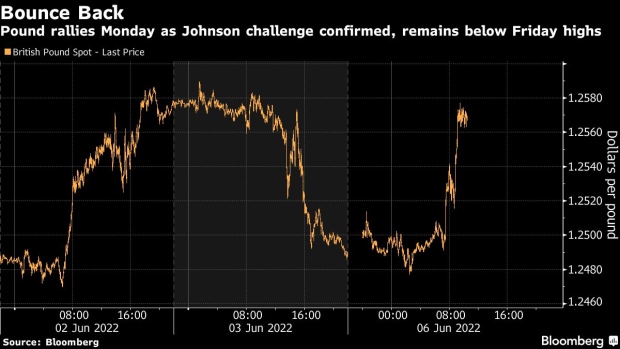Jun 6, 2022
Pound Traders in Untested Waters as Johnson Faces Rebellion
, Bloomberg News

(Bloomberg) -- UK politics is in the spotlight again as Prime Minister Boris Johnson faces a confidence vote, but how to trade the pound around his predicament isn’t quite straightforward.
Johnson’s fate fell into the hands of the ruling Conservative Party lawmakers after controversies including Covid lockdown parties that made him the first sitting prime minister found to have broken the law. But the news of the vote hardly affected the pound which rallied as UK markets returned from a holiday.
Confidence votes against former premiers -- from Margaret Thatcher to Theresa May -- have whipsawed the pound, but this time round the market implications are less clear with the Bank of England remaining the primary driver. That doesn’t mean it’s irrelevant for sterling; just that the uncertainties on the economic and monetary fronts are clouding its influence.
“Does it matter for the pound? Potentially yes, but not in the same clear way it did for Theresa May,” said Jordan Rochester, a currency strategist at Nomura. “We expect sterling to not materially react until the frontrunners in the competition and their policy agendas become clear.”
While the pound frequently reflected the twists and turns of Brexit negotiations, the UK currency’s recent performance has been all about the BOE and its response to surging inflation. Still, a new leader could prove a game-changer for the currency if it leads to a substantial policy shift, particularly in regards to the cost-of-living crisis and the nation’s relationship with the European Union.
The pound rallied Monday, rising 0.6% to $1.2559, following a decline of 1.1% last week. It is the second-worst performing major currency this year with traders concerned over the economic headwinds for the nation.
‘Just Noise’
Not everyone is convinced the election has any importance for the pound, immediate or otherwise.
“This is just noise,” said Geoffrey Yu, a senior FX strategist at Bank of New York Mellon, who sees increased fiscal spending whatever the outcome. “I don’t think it matters so much as the Westminster bubble would like it to.”
But for Rochester, who forged a reputation for UK political insights during Brexit, it’s all about what the potential successors are proposing. If they want to improve access to the European single market, subsidize consumer spending and advocate for broader fiscal stimulus, it could boost the pound.
Conversely, if they back unilaterally adjusting the Northern Ireland protocol while proposing to trim back government spending, it will weigh on sterling, he said.
“It’s so much uncertainty,” he said. “Boris may win the vote, delaying the inevitable.”
(Updates pound’s move)
©2022 Bloomberg L.P.








